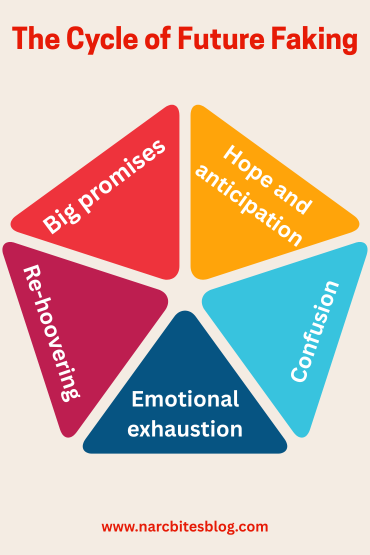Ever been promised a future that felt so vivid, so real you could almost touch it? Have you ever met someone who talked about your future like they’d already moved in, painting pictures so vivid you could almost taste them, the shared apartment, the Sunday coffee rituals, the vacations you hadn’t even dreamed of yet? It felt intoxicating, and then, just like that, it vanished into thin air. Welcome to the world of narcissist future faking.
Future faking is one of the most cunning narcissist manipulation tactics because it doesn’t start with lies. It starts with dreams.
What Is Future Faking?
Future faking is when a narcissist makes grand promises about the future to influence your present behavior. They talk about weddings, houses, travel, or children. Sometimes it’s as simple as, “Next year will be different.” Or, “I see us growing old together.”
But none of it is real. These aren’t goals. They’re control mechanisms. Empty promises weaponized to hook you emotionally, keep you compliant, and delay your awakening.
And if you confront them about the inconsistencies? They’ll accuse you of being impatient or ungrateful. The very idea that you’d question their vision becomes proof, in their mind, that you’re the one who’s broken the illusion.
Some narcissists even rehearse these scenarios—crafting narratives so detailed they can almost fool themselves. They play house in their mind, planning your future as a stage production rather than a shared life. You’re cast as a co-star, not a partner.
Why Future Faking Feels So Convincing
This delusional control gives them a sense of superiority. They choreograph every movement of the fantasy, while keeping their real-life commitment at zero.
They don’t future fake because they believe in a shared dream. They do it because they fear losing control. The fantasy becomes a leash, cleverly disguised as a gift. It binds you to their timeline, their pace, their version of what your life together should be.
And as time passes, the future becomes a weapon. Each missed milestone turns into emotional blackmail: “You expect too much,” or “You’re never satisfied.” They use the illusion of progress to stall accountability.
They may use selective memory to protect the narrative. If you recall a promise they made, they may claim you misunderstood. Or worse, that you made it up. You’ll begin to question whether the conversations ever happened at all.
You might even hear: “Why are you bringing this up again? I already said I want to be with you.” But vague intentions don’t equal commitment. In fact, the more uncertain their plans are, the more control they retain. Specificity means accountability—and they avoid that like the plague.
Some narcissists future fake with multiple people at the same time. It’s a way to secure several sources of supply. One promise here, another there, all carefully calibrated to create a web of emotional dependency. If one target starts pulling away, another is waiting in line, equally hooked by illusion.
They also future fake to gain access to things that benefit them directly—money, housing, sex, credibility. They’ll promise to settle down, start therapy, or change just enough to get what they need. Once it’s secured, the urgency evaporates. What once felt like a real plan becomes a vague, dismissive “someday.”

Why Do Narcissists Use Future Faking?
Because nothing keeps someone in a toxic relationship like hope.
Hope is a powerful form of emotional manipulation. It blurs red flags. It silences doubt. It convinces you to give them just a little more time.
But future faking isn’t just about buying time—it’s about emotional domination. The narcissist knows exactly how to dangle dreams in front of you like a carrot. And just when you get close enough to believe it’s real, they pull it away, only to offer it again later.
This cycle keeps you chasing a mirage instead of confronting reality. And that’s exactly how they want it.
They also use future faking to disguise their true intentions. While you’re mentally decorating your dream home, they’re planning how to keep you emotionally dependent. While you imagine family holidays and anniversaries, they’re scanning for ways to extract more from you—time, energy, attention, money.
How Future Faking Warps Your Sense of Reality
Psychologically, it’s a form of temporal gaslighting. They manipulate your perception of time. You start to question your memory—Didn’t we say we’d move in this summer? Didn’t he promise to start therapy? You scroll back through old messages searching for confirmation. And when you find it, they act like you misunderstood.
In essence, you’re always one conversation behind their intention. And that’s the point. They stay one step ahead in the story, so you’re always scrambling to catch up.
They will also future fake to avoid real intimacy. As long as the focus is on “someday,” they don’t have to show up in the now. They use your longing as a shield against their own emptiness.It’s easier to talk about a wedding than to actually learn to communicate. It’s easier to promise a vacation than to spend meaningful, vulnerable time with you.
Some narcissists even use future faking as a calculated risk management strategy. They know you’re noticing the cracks in their mask, so they patch it with promises. It’s a delay tactic, a distraction, a decoy.
And often, the promises become more elaborate the closer you are to leaving. When they sense you’re detaching, they craft bigger, more emotionally loaded visions like marriage, babies, spiritual awakening. It’s all strategically timed to rekindle your hope at the edge of your breaking point.
How Future Faking Feels
It feels like being kept in a suspended state of waiting. You can’t leave, because “things are about to get better.” You second-guess your intuition because “they said they care.”
You start reorganizing your life around things that haven’t even happened yet. You invest more, sacrifice more, adjust more. And when nothing materializes, you blame yourself. Maybe you’re the reason it didn’t work.
That’s the trap.
You’re not holding onto the relationship—you’re holding onto the promise of what the relationship could become. And that’s what keeps you stuck.
Future faking corrodes your sense of time. Days blur together. Months pass. You begin to lose track of how long you’ve been waiting. Your memories of reality grow dimmer while the fantasy remains vivid.
And the more time you’ve invested, the harder it is to walk away. It’s called the sunk cost fallacy—and narcissists rely on it. They know that if they keep the promise alive long enough, you’ll feel guilty leaving it behind.
Your inner narrative starts to shift. Instead of wondering “Is this real?” you start thinking “I’ve already waited this long. What if it changes tomorrow?” And so you stay. Not for what is, but for what might be.
And while you’re locked in that hope-laced purgatory, they maintain complete control.
The Fantasy That Keeps You Waiting
Over time, this emotional limbo turns into fatigue. It’s not just your heart breaking but your nervous system shutting down. You live in a constant state of anticipation, which eventually becomes exhaustion.
The dissonance between their words and actions begins to eat away at your ability to trust yourself. You start needing validation for your own experiences. You tell yourself stories that make them look better, just to avoid the pain of truth.
And maybe the cruelest part? They know it. They see the toll it takes on you. But your pain only reinforces their power. Your confusion means they’re still winning.
They might even future fake as a form of re-hoovering. After a period of distance or discard, they reappear with renewed vision: “Let’s start fresh. I see it all now. I want everything we talked about.” It’s the same script, different day.
But nothing changes—because nothing was ever real to begin with.
When Future Faking Becomes the Voice in Your Head
And that’s the harshest reality: they never saw the future the way you did. For them, it was just a stage prop. For you, it was a life. The longer you wait for that scene to play out, the further you drift from your own reality. And the more you try to hold onto their fantasy, the more you lose your own.
You stop bringing up the inconsistencies because you don’t want to “ruin the moment.” You begin policing your own needs in the name of “patience.”
Eventually, the cognitive dissonance is so loud it drowns out your own thoughts. You can’t tell the difference between loyalty and self-betrayal. And that’s when the future fake has done its job.
Not just because it kept you waiting but because it convinced you that waiting was noble.
And that is how the narcissist keeps winning long after the words are gone. Even in silence, the promise echoes. Even in absence, the fantasy haunts. And even in clarity, the question remains: What if they meant it this time?
That question, not the answer, is the trap. Because as long as that question lingers, the door remains ajar. And as long as the door remains ajar, they haven’t truly left, nor have you truly escaped


